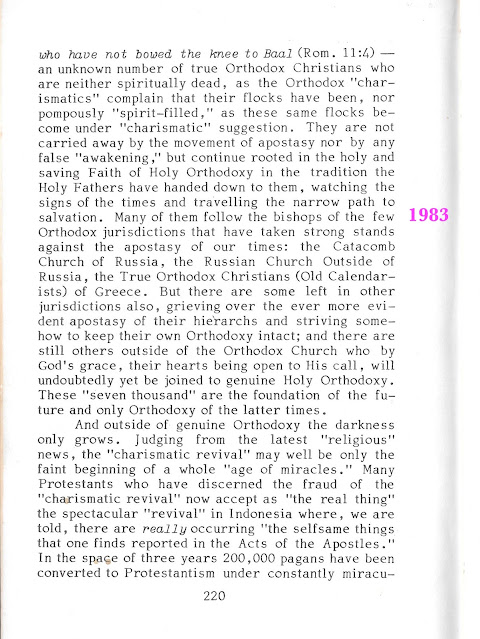This is a re-posting from the RRb which was deleted 5/17/23 by Blogger. I've revised the post and added new material. The original RRb post is archived in the Way Back Machine:
https://web.archive.org/web/20201208012222/http://remnantrocor.blogspot.com/2012/12/example-of-platina-rewriting-fr-seraphim_7.html
combined with an old Starting blog post: https://web.archive.org/web/20170115170733/http://startingontheroyalpath.blogspot.com/2012/12/explanation-of-remnant-rocor-blog-post.html
Orthodoxy and the Religion of the Future
First Printing April 1975
Second Printing August 1975
Third Printing May 1976
Fourth Printing (Second Edition) March 1979
Fifth Printing (Second Edition) February 1983
Sixth Printing (Third Edition) January 1990
Seventh Printing (Fourth Edition) December 1996
Eighth Printing (Fourth Edition) January 1999
Ninth Printing (Fifth Edition) December 2004
Compare editions: Orthodoxy and the Religion of the Future
Explanation of the difference:
1983 edition
... Many of them follow the bishops of the few Orthodox jurisdictions that have taken strong stands against the apostasy of our times: the Catacomb Church of Russia, the ROCOR, the TOC of Greece. But there are some left in other jurisdictions also, grieving over the ever more evident apostasy of their hierarchs and striving somehow to keep their own Orthodoxy intact; and there are still others outside the...
2004 edition
... Many of them follow the bishops of the few Orthodox churches that have taken strong stands against the apostasy of our times. But there are some left in other Orthodox churches also, grieving over the ever more evident apostasy of their hierarchs and striving somehow to keep their own Orthodoxy intact; and there are still others outside the...
The difference is in the substitution of the word "churches" for "jurisdictions." Fr. Seraphim clearly meant "jurisdictions" and he even named the royal path jurisdictions of his day. (Today we can also add the Old Calendar Bulgarians and the Old Calendar Romanians to Fr. Seraphim's list.)
The word "church," when not used as part of the name of a parish, and especially with a small "c," can mean "parish" or even "parish building" which can be in any jurisdiction, or even be a heterodox congregation. Platina's alteration in the 2004 edition conveys the implication that jurisdiction does not matter. It implies that any parish in world orthodoxy can be justified by having traditional characteristics or views, regardless of whether their bishops actually have valid apostolic succession.
The rewriting in the 2004 edition deceives readers into thinking that any parish could belong to the traditional "strong" category regardless of its jurisdiction. [How often we hear from the traditionally-minded people in world orthodoxy that they are "fighting from within"?]
Church with a capital "C" is understood by Orthodox to be the jurisdiction. We refer to the Greek Church, the Serbian Church, Russian Church, and the Ecumenical Council of all the Churches. Example: How many churches [parishes] are in the Russian Church [jurisdiction]?
Nobody has any excuse to change any of Fr. Seraphim's words.
Comparing 1979 with 1975. Further comparison shows that Fr. Seraphim himself made a change in the Second Edition/Second Printing.
(Notice that 1979 is identical to 1983.) Why this difference here? I'm safely certain that, in 1975, St. Fr. Seraphim considered the Old Calendar Greeks part of ROCOR. See Fr. Seraphim's letter #27, where in 1970 he sees the Greeks in Boston and the Greeks in Seattle both as being inside ROCOR. The Greeks were in ROCOR from 1965 —1986. He says the reason they were in ROCOR was because there was no other valid Church in North America. By the canons it is proper, when displaced in a foreign land, to join the local bishop, regardless of his nationality. It must have been later Fr. Seraphim came to see their separate "Greek-ness" in their own right — their innate rightful Orthodox identity is Greek. Metropolitan Philaret (now St. Philaret of New York) predicted, "after my death the Greeks will leave us, as they never were a part of us." When St. Philaret said that the Greeks were never part of us in the first place, he did not mean that their dogma is different from ours — he meant their Mother Church is different from ours. Back in 1975 this was not so clear, especially not to Americans who have no historic "Mother Church."
Today, though, it is more clear that it's far better for the GOC and the ROCOR to be Sister Churches, than to try to join as one Church. We have greater strength as individual Churches (jurisdictions) because we can support each other. And greater strength as Sisters in the whole of the Orthodox world; we are stronger as a team; "two hands are better than one"; more like in a marriage 1+1=3. This is the reason why I am so distressed that ROCOR has been so swallowed up by the SIR/GOC reunion since the ROCOR-MP union... The GOC hurts itself by absorbing its Sister Church into oblivion. The flow ROCOR members and parishes moving over to the GOC has been staunched, but we suffer the aftermath. Newcomers drawn to the ROCOR have no choice of true Orthodox parishes except GOC. It hurts all of Orthodoxy..
Read more:
http://startingontheroyalpath.blogspot.com/2009/08/0rthodoxy-and-religion-of-future.html
Files uploaded in Joanna's Shared Library:
- Orthodoxy Religion Future (1979)
- Letter #27 is in file named: All Letters
- folder named: RRb Archives









No comments:
Post a Comment
Comments are moderated. Anonymous comments are unlikely to be posted. Comments can be made by email.
joannahigginbotham@runbox.com